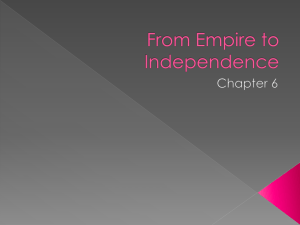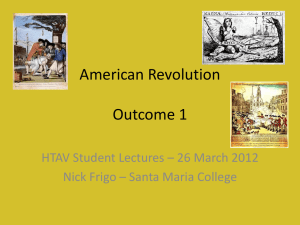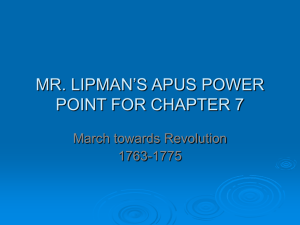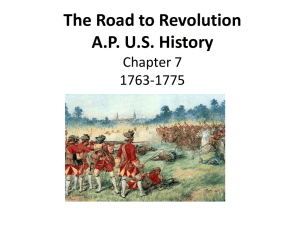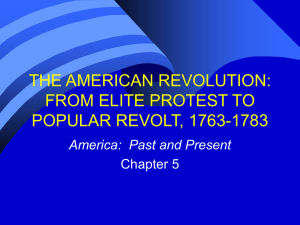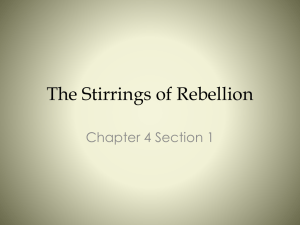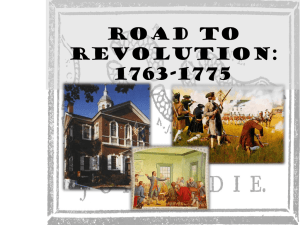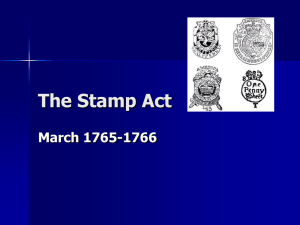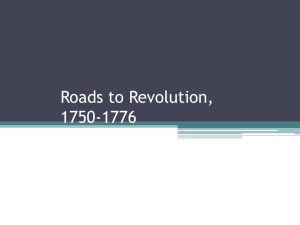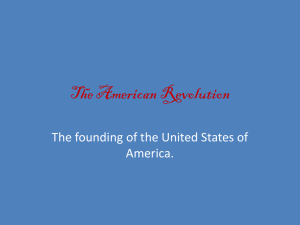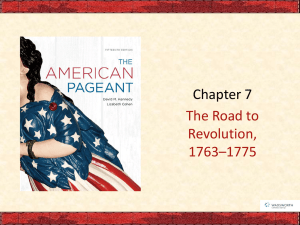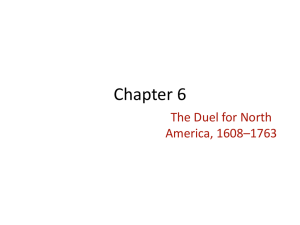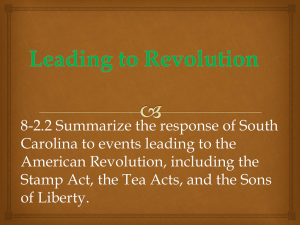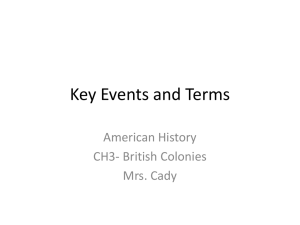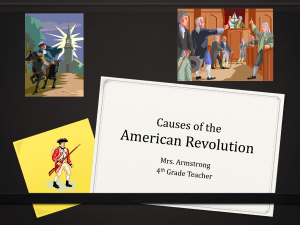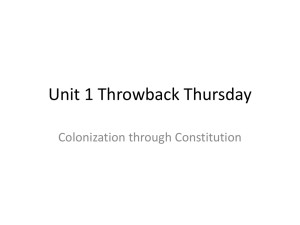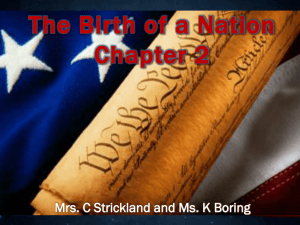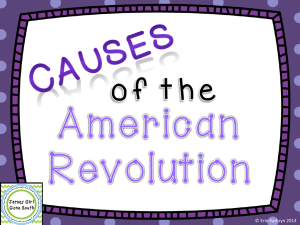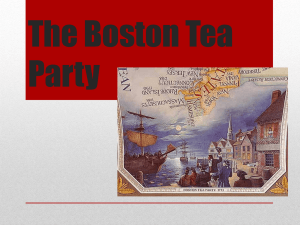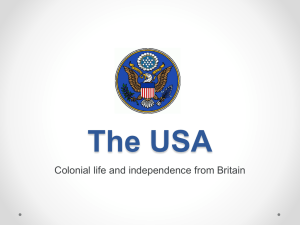USI Ch.4 Causes of the American Revolution PPT
advertisement
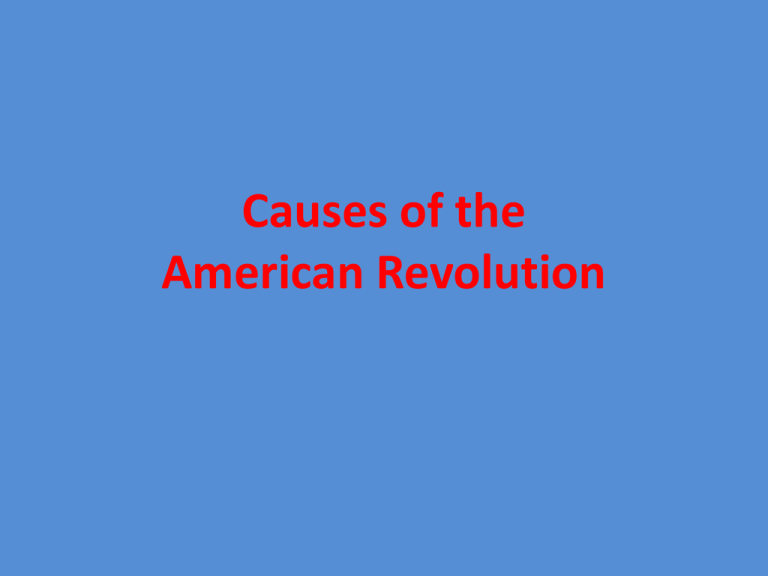
Causes of the American Revolution Objectives • Describe the colonists’ political heritage. • Explain the colonists’ reaction to new taxes. • Describe the methods the colonists used to protest British taxes. • Understand the significance of the First Continental Congress in 1774. Revolution • : the usually violent attempt by many people to end the rule of one government and start a new one • : a sudden, extreme, or complete change in the way people live, work, etc Terms and People • Stamp Act – 1765 act by Parliament that placed a tax on all printed materials • John Adams – Massachusetts lawyer who championed colonial independence • Patrick Henry – Virginia colonist who demanded “Give me liberty, or give me death.” • Sons of Liberty – Patriot associations that protested against British taxes • nonimportation agreements – colonial boycotts of British goods following the Stamp Act Terms and People (continued) • Boston Massacre – the 1770 shooting of five Boston citizens by British soldiers • committee of correspondence – provided leadership and cooperation between colonies • Boston Tea Party – 1773 Patriot protest against British tax on tea; Patriots dumped British tea into Boston Harbor • Intolerable Acts – colonial label for the Coercive Acts punishing Boston after the Boston Tea Party Terms and People (continued) • First Continental Congress – 1774 meeting of colonial delegates to protest the Intolerable Acts What caused the colonists to rebel against the British? Colonists enjoyed military protection, profits from trade, and political rights as British subjects. When Britain imposed taxes, colonists protested. These protests grew into rebellion and eventually turned into war. In the 1760s, colonists cherished their rights as Englishmen. • Due process of law • Freedom of the press • Trial by jury • Protection from foreign attack But, by modern standards, Britain was not very democratic. • Wealth and birth determined power and status. • There was no formal charter outlining citizen rights. • Only a quarter of British males could vote. • Parliament claimed virtual representation allowing it to make laws for all British subjects. In contrast, the colonies were quite democratic. • Most colonies had elected assemblies. • These charters outlined individual rights. • Colonial assemblies controlled royal governors by withholding their salaries if displeased. • Most males could vote for their assemblies but none could vote for members of Parliament. Comparing British and Colonial Governments Great Britain American Colonies King Inherited executive power Governor Appointed by the King but paid by colonial legislature Parliament Colonial Legislatures House of Lords Aristocrats with inherited legislative power Upper House or Council Prominent citizens appointed by the governor House of Commons Elected by the few wealthy property owners Lower House or Assembly Elected property owners about two-thirds of colonists After the French and Indian War, Parliament decided to tax the colonists. • The war raised Britain’s debt. Defending the colonies was expensive. • People in Britain already paid higher taxes. • By collecting taxes and paying royal governors directly, Parliament could take control away from the colonial assemblies. Action and Reaction • Britain wanted colonies to contribute to costs of protecting the empire • 1764 Sugar Act • Quartering Act (1765) – (more British soldiers are stationed in the colonies after the French and Indian War) Stamp Act • 1765 • Revenue stamps required to be place on most printed paper • To be paid directly by the people who used the goods • Colonists believed their rights (including the right not to be taxed without representation) were being threatened • Nine colonies sent delegates to Stamp Act Congress • Sons and Daughters of Liberty formed • Boycotts were used effectively Stamps p118 • 1766 Stamp Act repealed but Parliament passed the Declaratory Act which asserted its right to tax and make laws for the colonies “in all cases whatsoever.” Townshend Acts • 1767 • Duties on tea, glass, and paper – Return to indirect taxes – Paid to crown officials (so they would no longer be dependent upon colonial assemblies) – NY’s assembly suspended for defiance of the Quartering Act • Repealed 1770 New taxes caused colonists to shout– “No taxation without representation!” Sugar Act (1764) assigned customs officers and special courts to collect taxes and prosecute smugglers. Quartering Act (1765) required colonists to provide housing and supplies for British soldiers. Stamp Act (1765) taxed printed materials such as newspapers, books, and contracts. Parliament rejected colonist complaints by claiming: • Parliament represented, and could tax, any subject. • Other citizens couldn’t vote but still paid taxes. • The revenue was necessary. • The colonists could afford to pay their share. • The colonists were selfish and narrow-minded. Colonists protested in 3 ways: Intellectual Economic Violence • Argued that government is a social contract with citizens. • Advocated natural rights including life, liberty, and property. • Daughters of Liberty wore homespun only. • Nonimportation agreements called for a boycott of goods from Britain. • Rebels tarred and feathered tax collectors. • Mobs destroyed governor’s home and assaulted royal officials. • Boston Tea Party dumped British tea into harbor. Colonists held the Stamp Act Congress (October 1765) and boycotted British goods. Boston rioted against corrupt customs officials and seizure of John Hancock’s boat Liberty. Parliament repealed the Stamp Act but replaced it with the Townshend Acts (1767) that taxed glass, lead, paper, paint, and tea. The governor dissolved the Massachusetts legislature and 4,000 British troops were sent to Boston. Boston Massacre • March 1770 • British soldiers in Boston to protect customs officials • 5 killed In March 1770, British soldiers fired at a Boston mob, killing five. Patriots used this Boston Massacre to incite and organize colonists. p119 Parliament repealed the Townshend Acts except for the tax on tea. Parliament gave the British East India Company a special deal that made its tea cheapest in the colonies. In protest, in 1773 Boston Patriots dressed like Indians and dumped the tea into Boston harbor. p121 Parliament passed the Coercive Acts to punish Boston. • Closed the port of Boston • Quartered soldiers in Boston homes • Increased the governor’s power at expense of legislature • Allowed British officials to be tried in Britain Colonists formed committees of correspondence to coordinate protests against these Intolerable Acts. Intolerable Acts • 1774 • Response to the Boston Tea Party • Also known as the Coercive Acts – Port of Boston closed – Massachusetts legislature limited – Royal officials accuse of crimes could be tried in Great Britain – Quartering Act expanded to all colonies • Quebec Act (made Catholicism the official religion in Canada and extended its borders to the Ohio River) First Continental Congress • • • • • September-October 1774 Met in Philadelphia All colonies except Georgia sent delegates Called for a boycott of British goods Issued Declaration and Resolves that outlined colonial grievances • Agreed to meet again the following year In 1774 the First Continental Congress met in Philadelphia. Patrick Henry demanded, “Give me liberty, or give me death.” Most still hoped the king would side with them against Parliament. Some, like John Adams, believed a new country was being born. Second Continental Congress • May 1775 • Met in Philadelphia • Created the Continental Army and made George Washington its commander
